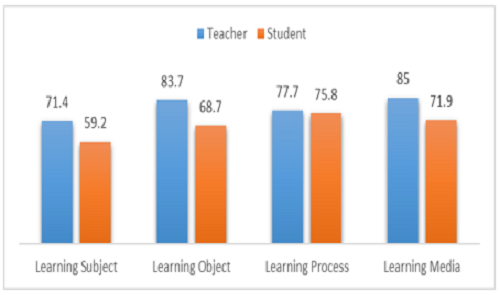
Needs Analysis of Learning Video Development Using Edpuzzle Based Problem Based Learning to Improve Critical Thinking Skills of High School Students
Abstract
Keywords
Full Text:
PDFReferences
Amaliah, A. (2020). Implementation Of Edpuzzle To Improve Students’ Analytical Thinking Skill In Narrative Text. Prosodi, 14(1), 35–44. https://doi.org/10.21107/prosodi.v14i1.7192
Amijaya, L. S., Ramdani, A., & Merta, I. W. (2018). Pengaruh Model Pembelajaran Inkuiri Terbimbing Terhadap Hasil Belajar Dan Kemampuan Berpikir Kritis Peserta Didik. Jurnal Pijar Mipa, 13 (2), 94. https://doi.org/10.29303/jpm.v13i2.468
Arikunto, Suharsimi. (2021). Dasar-Dasar Evaluasi Pendidikan Edisi 3 - Suharsimi Arikunto - Google Books. Bumi Aksara.
Caleon, I. S., Tan, Y. S. M., & Cho, Y. H. (2018). Does Teaching Experience Matter? The Beliefs and Practices of Beginning and Experienced Physics Teachers. Research in Science Education, 48 (1), 117–149. https://doi.org/10.1007/s11165-016-9562-6
Carrillo, J. A., Jin, S., Li, L., & Zhu, Y. (2021). A Consensus-Based Global Optimization Method For High Dimensional Machine Learning Problems. ESAIM: Control, Optimisation and Calculus of Variations, 27, S5. https://doi.org/10.1051/cocv/2020046
Ellianawati, Rudiana, D., Sabandar, J., & Subali, B. (2018). Focus group discussion in mathematical physics learning. Journal of Physics: Conference Series, 983, 012010. https://doi.org/10.1088/1742-6596/983/1/012010
Ervina, M. (2018). Implementasi Konsep Belajar Kognitivisme dalam Mata Pelajaran IPA Sekolah Dasar. Bidayatuna: Jurnal Pendidikan Guru Mandrasah Ibtidaiyah. https://doi.org/10.36835/bidayatuna.v1i1.599
Giyanto, Heliawaty, L., & Rubini, B. (2020). The Effectiveness Of Online Learning By Edpuzzle In Polymer Materials On Students’ Problem-Solving Skills. IOP Conference Series: Materials Science and Engineering, 959, 012006. https://doi.org/10.1088/1757-899X/959/1/012006
Hadi, S., & Novaliyosi. (2019). TIMSS Indonesia (Trends in International Mathematics and Science Study). Prosiding Seminar Nasional & Call For Papers Program Studi Magister Pendidikan Matematika Universitas Siliwangi, 562–569. http://jurnal.unsil.ac.id/index.php/sncp/article/view/1096
Lestari, M. Y., & Diana, N. (2018). Keterampilan proses sains (KPS) pada pelaksanaan praktikum Fisika Dasar I. Indonesian Journal of Science and Mathematics Education.
Lusiyana, A., Festiyed, & Yulkifli. (2019). The problems of integrating multiple representation skills in physics learning. Journal of Physics: Conference Series, 1185, 012035. https://doi.org/10.1088/1742-6596/1185/1/012035
Mulyadi, E. (2020). Pembelajaran Daring Fisika Melalui Whatsapp, Google Form, Dan Email Dalam Capaian Presensi Aktif Dan Hasil Belajar Peserta Didik. Jurnal Karya Ilmiah Guru, 5(1), 34–41.
Murdani, E. (2020). Hakikat Fisika dan keterampilan proses Sains. Jurnal Filsafat Indonesia, 3 (3), 72–80. https://ejournal.undiksha.ac.id /JFI/article/22195
Nugraha, A. J., Suyitno, H., & Susilaningsih, E. (2017). Analisis Kemampuan Berpikir Kritis Ditinjau dari Keterampilan Proses Sains dan Motivasi Belajar melalui Model PBL. Journal of Primary Education, 6(1), 35–43. https://doi.org/10.15294/jpe.v6i1.14511
Nurliana. (2021). Pengembangan Media Pembelajaran Video Interaktif Berbasis Explaindio Untuk Meningkatkan Literasi Informasi Dan Kemampuan Kognitif Peserta Didik Fisika SMA. //digilib.unri.ac.id/index.php
OECD. (2020). Programme for International Student Assesment (PISA) Result From PISA 2018. https://www.oecd.org/pisa/
Orcos Palma, L., Blázquez Tobías, P. J., Curto Prieto, M., Molina León, F. J., & Magreñán Ruiz, Á. A. (2018). Use of Kahoot and EdPuzzle by Smartphone in the Classroom: The Design of a Methodological Proposal (pp. 37–47). https://doi.org/10.1007/978-3-319-95522-3_4
Patandean, A. J., & Baharuddin, H. (2017). The Use Of Collaborative Learning Method With Reciprocal Technique In Physics Class Problem-Solving At A High School. World Transactions on Engineering and Technology Education, 15(3), 272–276.
Phungsuk, R., Viriyavejakul, C., & Ratanaolarn, T. (2017). Development of a problem-based learning model via a virtual learning environment. Kasetsart Journal of Social Sciences, 38(3), 297–306. https://doi.org/10.1016/j.kjss.2017.01.001
Richards, A. (2020). Teaching Electricity and Magnetism Using Kinesthetic Learning Activities. The Physics Teacher, 58(8), 572–576. https://doi.org/10.1119/10.0002380
Sari, I., Karim, S., Saepuzaman, D., Ramalis, T., & Rusdiana, D. (2020). The Development of Model-Based Learning in Introductory Physics: The effectiveness of improving Students Understanding in Heat and Heat Transfer. April 2021. https://doi.org/10.4108/eai.12-10-2019.2296491
Sari, N., Sunarno, W., & Sarwanto, S. (2018). Analisis Motivasi Belajar Siswa Dalam Pembelajaran Fisika Sekolah Menengah Atas. Jurnal Pendidikan Dan Kebudayaan, 3(1), 17. https://doi.org/10.24832/jpnk.v3i1.591
Silverajah, V. S. G., & Govindaraj, A. (2018). The Use Of Edpuzzle To Support Low-Achiever’s Development Of Self-Regulated Learning And Their Learning Of Chemistry. Proceedings of the 10th International Conference on Education Technology and Computers - ICETC 18, 259–263. https://doi.org/10.1145/3290511.3290582
Sirri, E. L., & Lestari, P. (2020). Implementasi Edpuzzle Berbantuan Whatsapp Group Sebagai Alternatif Pembelajaran Daring Pada Era Pandemi. Jurnal Pendidikan Matematika, 5(2), 67–72.
Sundi, V. H., Astari, T., Rosiyanti, H., & Ramadhani, A. (2020). Efektivitas Penggunaan Edpuzzle dalam Meningkatkan Motivasi Belajar pada Masa Pandemi Covid-19. Seminar Nasional Pengabdian Masyarakat LPPM UMJ, 1–10. http:jurnal.umj.ac.id/index.php/semnaskat
Yustiandi, & Saepuzaman, D. (2016). Kesulitan Siswa SMA dalam Memahami Materi Rangkaian Listrik Arus Searah. Prosiding : Seminar Nasional Pendidikan IPA Pascasarjana UM, 1, 513–518.
DOI: http://dx.doi.org/10.31258/jes.7.1.p.27-34
Refbacks
- There are currently no refbacks.
Copyright (c) 2023 Fitri Dwi Hartati

This work is licensed under a Creative Commons Attribution 4.0 International License.
Publisher: FKIP Universitas Riau












